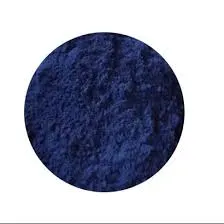Custom Natural Indigo Dye - Sustainable and Vibrant Solutions
The Art and Science of Custom Natural Indigo Dye
Indigo dye has a rich history that dates back thousands of years, deeply intertwined with various cultures across the globe. Unlike synthetic dyes, natural indigo is revered for its vibrant blue color and its sustainability, making it increasingly popular among artisans, designers, and eco-conscious consumers. The process of creating custom natural indigo dye involves a blend of artistry and science, emphasizing traditional techniques while adapting to modern needs.
The journey of natural indigo begins with the plant species Indigofera, from which the dye is derived. The leaves are harvested, fermented, and then extracted to produce a pigment that is both beautiful and environmentally friendly. The use of natural dyes is not only beneficial for the environment but also supports biodiversity and sustainable agricultural practices.
When creating custom indigo dye, artisans often start by carefully selecting the variety of indigo plant to use, as different species can yield unique shades and qualities of blue. The dyeing process involves preparing a vat, where the indigo pigment is reduced to a soluble form—this is known as the indigo vat process. This stage is crucial, as it determines the vibrancy and depth of the blue produced. By controlling the pH levels and adding natural reducing agents such as sugar or henna, artisans can create a personalized dye that reflects their artistic vision.
custom natural indigo dye

One of the most fascinating aspects of indigo dyeing is the way the color develops. When fabric is first pulled from the dyebath, it appears green, only to oxidize and transform into a rich blue as it comes into contact with air. This characteristic transition not only adds a sense of magic to the process but also offers opportunities for experimentation with various dyeing techniques.
Artisans can create a vast spectrum of shades and patterns through custom techniques such as shibori (a Japanese tie-dye technique) or batik (a wax-resist dyeing method). Each piece becomes a unique work of art, combining tradition with personal expression. Moreover, the combination of indigo dye with other natural mordants and dyes allows for the creation of intricate designs, showcasing the versatility of this ancient craft.
Sustainability plays a significant role in the resurgence of natural indigo dyeing. With growing awareness of environmental challenges posed by synthetic dyes, many consumers are seeking ethically made products. Dyeing with natural indigo not only reduces chemical waste but also supports local economies and promotes heritage crafts.
In conclusion, custom natural indigo dyeing represents a harmonious blend of skill, nature, and sustainability. Each indigo-dyed piece tells a story, reflecting the artisan’s intent and the rich history behind this beloved dye. As we continue to embrace slow fashion and responsible consumption, the allure of natural indigo remains strong, promising a vibrant future for this age-old craft.
-
The Timeless Art of Denim Indigo Dye
NewsJul.01,2025
-
The Rise of Sulfur Dyed Denim
NewsJul.01,2025
-
The Rich Revival of the Best Indigo Dye
NewsJul.01,2025
-
The Enduring Strength of Sulphur Black
NewsJul.01,2025
-
The Ancient Art of Chinese Indigo Dye
NewsJul.01,2025
-
Industry Power of Indigo
NewsJul.01,2025
-
Black Sulfur is Leading the Next Wave
NewsJul.01,2025

Sulphur Black
1.Name: sulphur black; Sulfur Black; Sulphur Black 1;
2.Structure formula:
3.Molecule formula: C6H4N2O5
4.CAS No.: 1326-82-5
5.HS code: 32041911
6.Product specification:Appearance:black phosphorus flakes; black liquid

Bromo Indigo; Vat Bromo-Indigo; C.I.Vat Blue 5
1.Name: Bromo indigo; Vat bromo-indigo; C.I.Vat blue 5;
2.Structure formula:
3.Molecule formula: C16H6Br4N2O2
4.CAS No.: 2475-31-2
5.HS code: 3204151000 6.Major usage and instruction: Be mainly used to dye cotton fabrics.

Indigo Blue Vat Blue
1.Name: indigo blue,vat blue 1,
2.Structure formula:
3.Molecule formula: C16H10N2O2
4.. CAS No.: 482-89-3
5.Molecule weight: 262.62
6.HS code: 3204151000
7.Major usage and instruction: Be mainly used to dye cotton fabrics.

